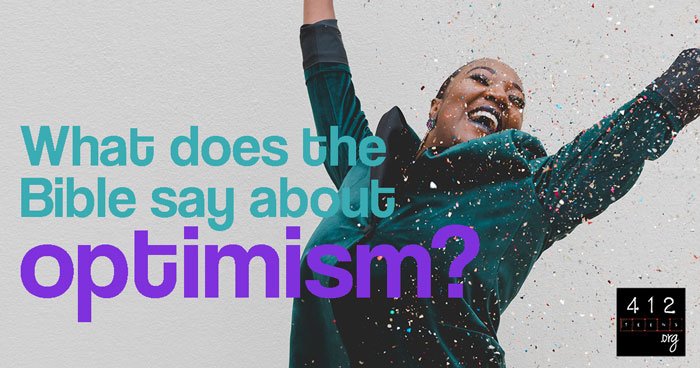What does the Bible say about optimism?

A glass half full and a cloud with a silver lining—both are common symbols for optimism. Optimists, by nature, tend to dwell on the positive outcomes and hold out hope for better possibilities regardless of their faith. While optimism can feel a lot like godly faith, it is not necessarily the same.
Worldly optimism is not based on faith in God. Instead, many put their trust in vague "powers," such as karma or the will of the universe, to make the right thing happen. However, these aren't real concepts and cannot be relied upon. Many unbelievers place faith in these "lesser gods" to maintain their optimism. Often, people choose to be optimists because they will be regarded as more pleasant to be around since they always see the bright side. But we must be careful not to place trust in a misplaced hope with no true foundation.
This does not mean that every optimist is misplacing or abandoning their faith or trust. We need to examine where our optimism is coming from though and how it relates to the reality of life.
Should Christians be optimists?
Because we have a natural tendency toward sin (Romans 3:23), sometimes Christians will unconsciously place their faith in these same lesser gods. A Christian's optimism can sometimes stem from unfounded beliefs about God, such as thinking that if we hope and pray for something long and hard enough, then it will definitely happen. We may try to only express positivity because we fear that any negative thoughts will "cancel out" our positive prayers.
Situations like these are examples of false optimism since they aren't based in the truth of God's character but on our own ability to believe hard enough. When we cannot have what we wished for, feelings of anger, jealousy, and confusion towards God and others may arise.
Biblical Optimism: Hope
Biblical optimism is the result of faith in God and trust in His ultimate plan and will. This kind of faith and trust can be described in one word: hope. Romans 15:13 says, “May the God of hope fill you with all joy and peace as you trust in him, so that you may overflow with hope by the power of the Holy Spirit.”
What does it mean to truly hope? When we hope in God, we are putting our full trust and faith into the knowledge that His plan is best—despite what surrounding evidence may infer. Isaiah 40:31 says that “those who hope in the Lord will renew their strength. They will soar on wings like eagles; they will run and not grow weary they will walk and not be faint.” Romans 8:23-25 explains, “But hope that is seen is no hope at all. Who hopes for what they already have? But if we hope for what we do not yet have, we wait for it patiently.”
Our God is amazing. He will cherish us, provide for us, and conquer our enemies for eternity. In return, He only asks for our faith to remain steadfast. Philippians 4:19 reminds us that "God will meet all your needs according to the riches of his glory in Christ Jesus." With this passage, we can gain confidence during difficult moments.
Biblical optimism gives us the opportunity to process difficult things faster, knowing that God will make “all things work together for good to those who love God and are called according to His purpose” (Romans 8:28). With hope, we can understand and be assured that He “will wipe every tear from our eyes” when we enter the kingdom of Heaven and that our earthly problems will only be temporary (Revelation 21:4).
God encourages us to have hope. The psalmist says in Psalm 43:5, "Why, my soul, are you downcast? Why so disturbed within me? Put your hope in God, for I will yet praise him, my Savior and my God." Optimism is a choice we make when faced with difficult things. When we choose to trust in God, we allow Him to take care of us in the ways only He can and trust that whatever happens is a part of His divine plan for our lives. Even in our darkest moments, if we put our hope into God's hands, we need not truly suffer, for our hope is in His will and His ways.
"For my thoughts are not your thoughts, neither are your ways my ways, declares the Lord. For as the heavens are higher than the earth, so are my ways higher than your ways and my thoughts than your thoughts." —Isaiah 55:8-9
ALSO SEE:


TL;DR
Optimists, by nature, tend to dwell on the positive outcomes and hold out hope for better possibilities regardless of their faith. Biblical optimism is the result of faith in God and trust in His ultimate plan and will. This kind of faith and trust can be described in one word: hope (Romans 15:13). When we hope in God, we are putting our full trust and faith into the knowledge that His plan is best—despite what surrounding evidence may infer (Romans 8:23-25). When we choose to trust in God, we allow Him to take care of us in the ways only He can and trust that whatever happens is a part of His divine plan for our lives.

Writer: Hayley Olsen
Hayley has loved the creative arts since she was little. Writing has been amongst her favorite things, and now she’s very excited to be presented with the opportunity to glorify God by using one of her passions. Other favorites include cooking, riding horses, and drawing.
